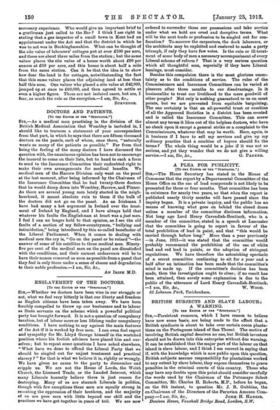ENSLAVEMENT OF THE DOCTORS.
[To THE EDITOR OP THE "SPECTATOR."] SIR,—Whether we doctors have been wise in our struggle or not, what we feel very bitterly is that our liberty and freedom as English citizens have been taken away. We have been forcibly compelled to throw up our businesses and to labour as State servants on the scheme which a powerful political party has brought forward. It is not a question of compulsory taxation, but of labour more or less lifelong under compulsory conditions. I have nothing to say against the main features of the Act if it is worked by free men. I can even feel regret and sympathy for Mr. Lloyd George himself in the wretched position where his foolish advisers have placed him and our- selves ; but to repeat some questions I have asked elsewhere, "What have we done to offend the Liberal Party that we should be singled out for unjust treatment and practical slavery " for that is what we believe it is, rightly or wrongly. We have given no cause to the party to dismember and cripple us. We are not the House of Lords, the Welsh Church, the Licensed Trade, or the Landed Interest, which many Liberals honestly believe there is just reason for destroying. Many of us are staunch Liberals in politics, though with few exceptions these men are equally strong in resenting the oppression of their brethren, and the majority of us are poor men with little beyond our skill and the practices we have got together in years of toil. We are now
ordered to surrender these our possessions and take service under what we hold are cruel and deceptive terms. What will be the next trade or profession to be singled out for con- fiscation P To-morrow the carpenters, the dock labourers, or the architects may be exploited and enslaved to make a party triumph, if only they have few votes. Is the ruin or ill-treat- ment of some body of men a necessary accompaniment of every Liberal scheme of reform ? That is a very serious question which all thoughtful men, especially if they have Liberal leanings, must consider.
Besides this compulsion there is the most glorious uncer- tainty as to the conditions of service. The rules of the Commissioners and Insurance Committees can be varied at pleasure after three months to our disadvantage. Is it businesslike to trust our livelihood to the mere goodwill of other people ? Not only is nothing guaranteed to us on most points, but we are prevented from equitable bargaining. The one certainty is that an all-powerful trust or combine of all the Approved Societies in a district has been created and is called the Insurance Committee. This can screw almost any terms it likes out of the helpless doctors, who have no check upon it except a general strike or a complaint to the Commissioners, whatever that may be worth. Here, again, is it business if I have to sell my services and give up my ordinary practice that a combine of buyers should fix the terms ? The whole thing would be a joke if it was not so serious, and yet they wonder that we do not give a willing


























































 Previous page
Previous page